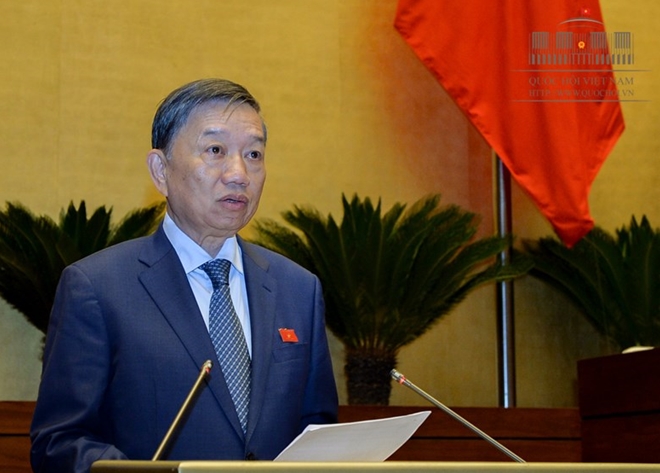NA discusses draft Law on Amnesty (amended)
Under the authorization of the Prime Minister, Senior Lieutenant General To Lam, Member of the Politburo, Minister of Public Security on May 21 presented the draft amendment to the Law on Amnesty to deputies of the National Assembly (NA).
 |
| Minister To Lam presents the draft amendment to the Law on Amnesty to deputies of the National Assembly |
According to the draft amendment, amnesty is defined as an official pardon granted by the State to convicts with fixed-term imprisonment or life imprisonment reduced to fixed-term imprisonment; this helps encourage offenders to repent of their wrongdoings, and study and work hard in order to get the State’s clemency and early reintegrate into society.
During the past 10 years implementing the Law on Amnesty, the State President of Vietnam has issued 07 amnesty decisions on the occasion of major national celebrations. From 2009 to 2016, the State President granted amnesty to 85,897 prisoners and 1,123 convicts with delayed or suspended imprisonment sentences.
According to reports from various police units, most of more than 87,000 special amnesty grantees returned to their original residential places and received supports from the local police in applying for their new residence and personal documents. Nearly 50,000 special amnesty grantees have now had jobs with stable incomes. In particular, the rate of crime-recommitting people is relatively low (1.16%).
Minister To Lam emphasized that the State President's decision on special amnesty has a great impact on society, creating a motive for convicts to try to serve their sentences, study and work harder during their imprisonment; at the same time, it receives the support and consensus from convicts’ relatives as well as from people from all walks of life.
In the current situation, the amendment and supplementation of the 2007 Law on Amnesty is necessary in order to concretize the State President's authority on special amnesty stipulated in the Constitution of 2013; to ensure the uniformity of the whole legal system; and resolve the difficulties and shortcomings in the implementation of the 2007 Law on Special Amnesty during the past 10 years.

